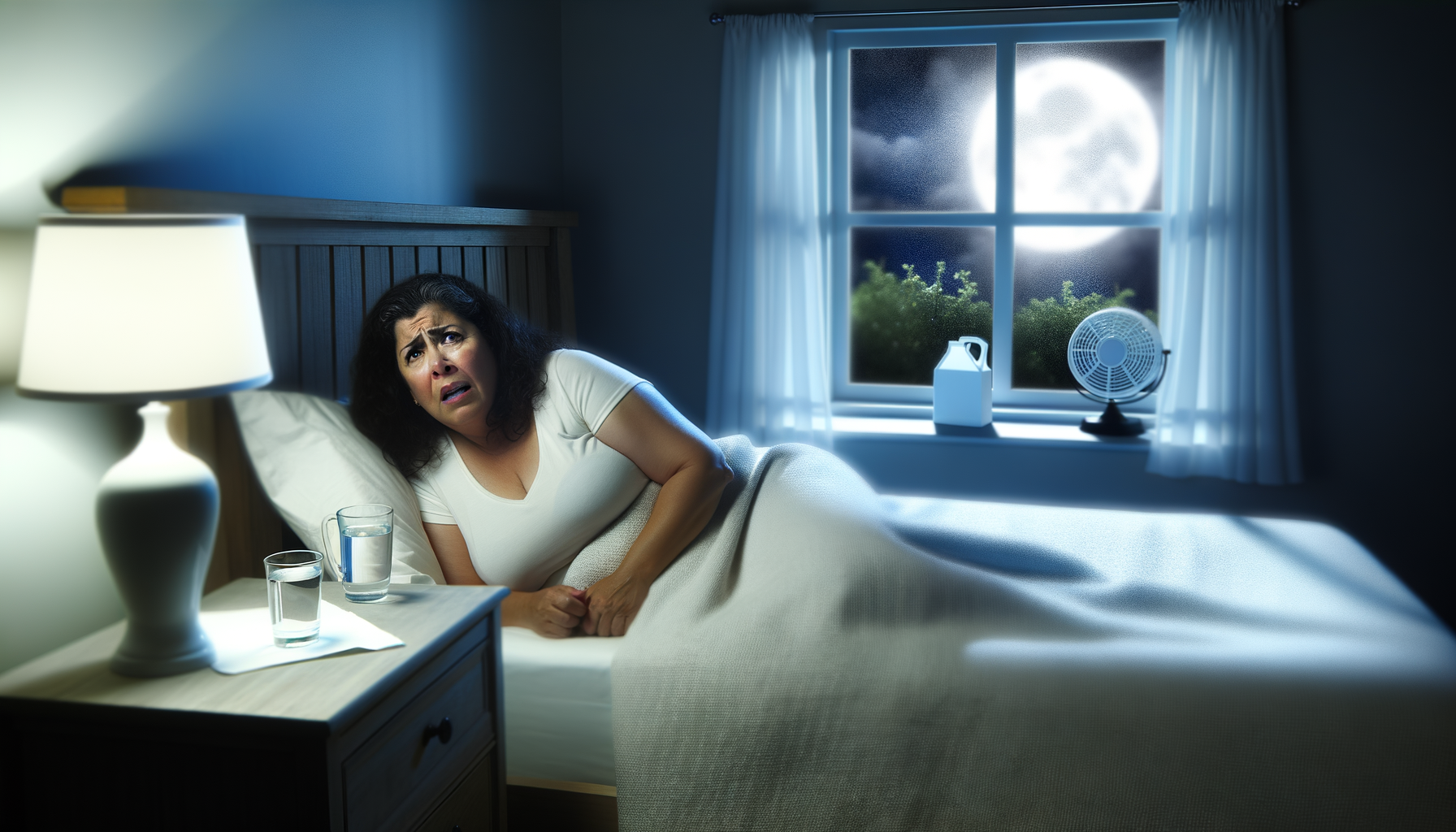Introduction to Menopause and Nightmares
Menopause marks the end of a woman’s reproductive years, signifying the cessation of menstruation. This natural biological process typically occurs between the ages of 45 and 55. Menopause is preceded by perimenopause, a transitional phase where hormonal fluctuations can cause a variety of symptoms. These symptoms include hot flashes, night sweats, mood swings, and changes in sexual function. Importantly, sleep disturbances such as insomnia and poor sleep quality are also common during this time. The decline in hormones like estrogen and progesterone can disrupt the sleep-wake cycle, leading to difficulties in both falling and staying asleep.
Defining Nightmares and Their Impact on Sleep
Nightmares are distressing dreams that often result in the individual waking up feeling anxious and scared. They typically occur during the rapid eye movement (REM) stage of sleep, when the brain is most active. Nightmares can lead to a fear of going to sleep, bedtime anxiety, and daytime fatigue. Unlike night terrors, which are more common in children and involve physical reactions without waking, nightmares are vividly recalled and can significantly impact an individual’s quality of sleep and overall well-being.
Exploring the Connection Between Menopause and Increased Nightmares
Research suggests that the hormonal changes associated with menopause may contribute to an increase in nightmares and other sleep disturbances. Lower levels of estrogen and progesterone can lead to a lighter, more fragmented sleep, making it easier for women to awaken from nightmares and remember them. Additionally, menopause-related stress and anxiety can infiltrate sleep, manifesting as nightmares. A study in the County of Jämtland, Sweden, found that women aged 40-64 with frequent nightmares reported increased occurrences of spasmodic chest pain and irregular heartbeats, with these symptoms intensifying post-menopause. This highlights the intricate relationship between sleep quality, nightmares, and menopausal symptoms, emphasizing the need for a deeper understanding and effective management strategies.
The Science Behind Nightmares During Menopause
Hormonal Changes and Their Effects on Sleep
Menopause is a significant period in a woman’s life marked by the end of menstrual cycles and a series of hormonal changes, particularly in estrogen and progesterone levels. These hormones are not only crucial for reproductive health but also play a vital role in sleep regulation. Estrogen is known to facilitate the onset of sleep and improve the quality of sleep, while progesterone has a calming effect and can act as a natural sleep aid. As these hormone levels fluctuate and ultimately decline during menopause, women often experience sleep disturbances, including insomnia and poor sleep quality. This disruption in sleep can create an environment conducive to nightmares, as the lack of deep, restorative sleep can lead to more frequent awakenings and a higher likelihood of recalling distressing dreams that occur during the REM (rapid eye movement) stage of sleep.
Stress and Anxiety as Catalysts for Nightmares
Menopause can be a stressful time due to the physical and emotional changes it brings. Stress and anxiety are well-documented triggers for nightmares in both men and women. The body’s response to stress can lead to increased awakenings and a heightened state of alertness during the night, which can interrupt the sleep cycle and increase the chances of experiencing vivid and often unsettling dreams. Additionally, the stress associated with menopause-related symptoms, such as hot flashes and night sweats, can exacerbate anxiety levels, further contributing to the occurrence of nightmares.
Other Contributing Factors to Nightmares
Beyond hormonal changes and stress, there are several other factors that may contribute to an increase in nightmares during menopause. These include:
- Sleep Disorders: Conditions such as sleep apnea and restless legs syndrome are more prevalent during menopause and can lead to fragmented sleep, which is associated with an increased frequency of nightmares.
- Medications: Certain medications taken during menopause, including some antidepressants and blood pressure medications, can have side effects that include nightmares.
- Lifestyle: Consumption of alcohol and caffeine can affect sleep quality and are known to influence dream content and frequency. Additionally, dietary habits, such as eating late at night, can increase metabolic activity and brain arousal, potentially leading to more intense dreams.
- Psychological Factors: Menopause can be a time of significant psychological adjustment, and past traumas or stressors may resurface in the form of nightmares. Women who have experienced traumatic events may be more susceptible to nightmares during this time.
Understanding these factors is crucial for addressing and managing nightmares during menopause. By recognizing the multifaceted nature of sleep disturbances, women can seek appropriate interventions to improve sleep quality and reduce the incidence of distressing dreams.
Lifestyle and Environmental Triggers
Dietary Habits and Nighttime Eating
The foods we consume and our eating patterns can significantly influence our sleep quality. For menopausal women, certain dietary habits may exacerbate sleep disturbances, including nightmares. Consuming heavy or spicy meals close to bedtime can lead to discomfort and indigestion, which may disturb sleep and trigger nightmares. Additionally, foods and beverages containing caffeine or alcohol can interfere with the sleep cycle, potentially leading to increased awakenings and vivid dreams or nightmares.
Medications and Substances That May Induce Nightmares
Various medications and substances can impact dream patterns and potentially contribute to nightmares. Menopausal women are often prescribed medications such as benzodiazepines, antidepressants, and hormone replacement therapy, which can alter sleep architecture and may lead to an increase in nightmares. It is essential for healthcare providers to review medication lists and consider the potential side effects on sleep when treating menopausal symptoms.
The Role of Trauma and PTSD in Sleep Disturbances
Experiences of trauma and the presence of post-traumatic stress disorder (PTSD) can significantly affect sleep quality and are known to be associated with nightmares. For menopausal women who have a history of trauma or PTSD, the hormonal fluctuations and stress associated with menopause can further aggravate these sleep disturbances. It is crucial to address these underlying issues through appropriate therapeutic interventions to manage sleep-related concerns effectively.
Influence of Media Consumption on Dream Patterns
The content we engage with before bedtime, including television, movies, and social media, can influence our subconscious and manifest in our dreams. Exposure to distressing or stimulating media can increase the likelihood of experiencing nightmares. Menopausal women may benefit from establishing a calming pre-sleep routine that avoids disturbing media content to promote more restful sleep and reduce the occurrence of nightmares.
In conclusion, lifestyle and environmental factors play a pivotal role in the sleep experience of menopausal women. By understanding and addressing these triggers, it is possible to mitigate their impact on sleep and improve overall sleep quality, thereby reducing the frequency and intensity of menopause-related nightmares.

Bette 100% All-Natural Relaxing Lavender Body Lotion.
Chemical-Free
Your relaxing night time body moisturizer to leave the day’s stress behind. Decompress and wish your body good night with the calming scent of lavender.
Natural Strategies for Managing Nightmares
Stress-Reduction Techniques for Daytime and Evening
Managing stress is a cornerstone in the battle against nightmares, particularly during menopause. Daytime stress-reduction can include activities such as meditation, deep breathing exercises, yoga, or tai chi. These practices not only calm the mind but also help regulate the body’s stress response, potentially reducing the frequency of nightmares. In the evening, winding down with a relaxing routine is crucial. This might involve reading, listening to soothing music, or a warm bath. Limiting exposure to screens and blue light before bed is also recommended to enhance sleep quality and minimize stress.
Creating a Sleep-Conducive Environment
A sleep-conducive environment is essential for preventing nightmares and ensuring restful sleep. Keep the bedroom cool, dark, and quiet, using blackout curtains and white noise machines if necessary. Invest in a comfortable mattress and pillows, and consider the use of calming scents like lavender which can be introduced through essential oils or diffusers. The goal is to make your bedroom a sanctuary for sleep, free from stressors and distractions.
The Importance of Magnesium and Sleep Hormones
Magnesium plays a pivotal role in supporting sleep by regulating neurotransmitters and the production of melatonin, the hormone that controls the sleep-wake cycle. Including magnesium-rich foods in your diet, such as leafy greens, nuts, and seeds, or considering a magnesium supplement can be beneficial. Additionally, maintaining a consistent sleep schedule supports natural melatonin production, which can be disrupted during menopause.
Herbal Remedies and Their Efficacy
Herbal remedies have long been used to combat sleep disturbances and may be particularly helpful for menopausal women experiencing nightmares. Herbs such as chamomile, valerian root, and passionflower are known for their sedative properties and can be consumed as teas or supplements. Creating a dream pillow filled with dried herbs like lavender or mugwort can also promote relaxation and more pleasant dreams. While herbal remedies can be effective, it’s important to consult with a healthcare provider before starting any new supplement, especially if you are taking other medications.

Supplemental Aids for Sleep and Nightmare Prevention
Evaluating the Role of Sleep Supplements
Supplements have become a popular aid for individuals looking to improve their sleep quality, especially during life transitions such as menopause. While lifestyle and behavioral changes remain foundational for long-term sleep health, supplements can play a supportive role. Melatonin, for instance, is widely recognized for its ability to regulate sleep-wake cycles and improve sleep quality. However, it’s important to note that the efficacy of melatonin and other supplements can vary significantly, and their content may not always match label claims. Therefore, it’s crucial to source these supplements from reputable providers and discuss their use with a healthcare professional to ensure they are appropriate for your individual health needs.
Herbal Supplements vs. Prescription Sleep Aids
When considering sleep aids, there is often a debate between choosing herbal supplements and prescription medications. Herbal supplements, such as magnolia bark and L-Theanine, are generally perceived as natural alternatives that can promote relaxation and improve sleep without the side effects commonly associated with prescription drugs. On the other hand, prescription sleep aids may offer more immediate relief for severe sleep disturbances but can come with risks such as dependency and withdrawal symptoms. It is essential to weigh the benefits and potential risks of each option and to consider the nature and severity of the sleep issues being addressed.
The Potential Benefits of Natural Sleep Supplements
Natural sleep supplements offer a range of potential benefits for individuals experiencing menopause-related sleep disturbances. Supplements like magnesium and 5-HTP not only support sleep but also play roles in mood regulation and appetite control, which can be particularly beneficial during menopause. Additionally, valerian root and hops are known for their calming effects on the nervous system, potentially improving sleep quality and duration. CBD, while not traditionally categorized as a supplement, has also gained attention for its sleep-promoting and pain-relieving properties. As with all supplements, it is imperative to consult with a healthcare provider before starting any new regimen, particularly to avoid interactions with other medications and to tailor the approach to individual health considerations.
When to Seek Professional Help
Identifying When Nightmares Are a Serious Concern
While occasional nightmares are common and often not a cause for concern, there are certain situations where they may indicate a deeper issue. It’s important to consider seeking professional help if:
- Nightmares are frequent and persistent: Experiencing nightmares several times a week over an extended period may be a sign of an underlying problem.
- Daytime functioning is affected: If nightmares are causing significant distress or impairment in social, occupational, or other important areas of functioning, this is a red flag.
- Physical safety is at risk: Nightmares that lead to physical actions, such as sleepwalking or other behaviors that could cause harm, require immediate attention.
- Signs of underlying mental health issues: Nightmares that are accompanied by symptoms of anxiety, depression, or PTSD should be addressed by a professional.
The Role of Mental Health Professionals in Treating Sleep Disorders
Mental health professionals play a crucial role in diagnosing and treating sleep disorders, including those related to menopause. They can provide:
- Assessment and Diagnosis: A thorough evaluation to determine the nature of the sleep disturbance and any associated psychological factors.
- Cognitive Behavioral Therapy (CBT): Evidence-based treatment that can help modify beliefs and behaviors that contribute to sleep problems.
- Stress Management Techniques: Training in relaxation methods, mindfulness, and other strategies to reduce stress that may be contributing to nightmares.
- Medication Management: In some cases, medication may be prescribed to help manage symptoms, although this is typically considered after other treatments have been tried.
What to Expect from a Healthcare Provider Visit
When visiting a healthcare provider for menopause-related nightmares, you can expect:
- A Medical Evaluation: A review of your medical history, sleep patterns, and any medications or supplements you’re taking.
- Lifestyle Discussion: Conversations about your diet, exercise, caffeine and alcohol consumption, and bedtime routines.
- Possible Referrals: Depending on the findings, you may be referred to a sleep specialist for further evaluation, such as a sleep study.
- Treatment Plan: A personalized plan that may include lifestyle changes, therapy, and possibly medication.
- Follow-up: Ongoing appointments to monitor your progress and make any necessary adjustments to your treatment plan.
Remember, seeking help is a sign of strength. Addressing sleep disturbances and nightmares during menopause can significantly improve your quality of life.
Conclusion: Managing Menopause-Related Nightmares
Summarizing Natural Management Strategies
Throughout the menopausal transition, many women experience an increase in sleep disturbances, including nightmares. Natural management strategies can play a pivotal role in mitigating these sleep disruptions. Regular exercise has been shown to improve sleep quality, helping women both fall and stay asleep. Creating a sleep-conducive environment is also crucial; this includes maintaining a cool, dark, and quiet bedroom, and establishing a calming pre-sleep routine. Additionally, stress-reduction techniques such as deep breathing, meditation, and yoga can be beneficial in promoting relaxation and improving sleep patterns. Dietary adjustments, like limiting caffeine and alcohol intake, especially in the evening, can also help in reducing the likelihood of nightmares.
The Importance of Addressing the Root Causes of Stress
Addressing the root causes of stress is essential in managing menopause-related nightmares. Stress and anxiety are known catalysts for sleep disturbances, and they can exacerbate the frequency and intensity of nightmares. It is important for women to identify stressors in their lives and employ stress management techniques to cope with them effectively. This may include seeking support from friends and family, engaging in hobbies, or practicing mindfulness. In some cases, professional help from a therapist or counselor may be necessary to develop effective coping strategies and address underlying issues such as anxiety or depression.
Encouragement for Women Experiencing Menopause-Related Nightmares
For women experiencing menopause-related nightmares, it is important to remember that you are not alone, and that this is a common symptom during this phase of life. It is also crucial to recognize that these disturbances are manageable with the right strategies and support. Women should be encouraged to prioritize their sleep health and not hesitate to seek help if nightmares persist. Healthcare providers can offer guidance on appropriate treatments, which may include lifestyle changes, natural remedies, or medical interventions. With patience and proactive management, it is possible to achieve restful sleep and improve overall well-being during menopause.












